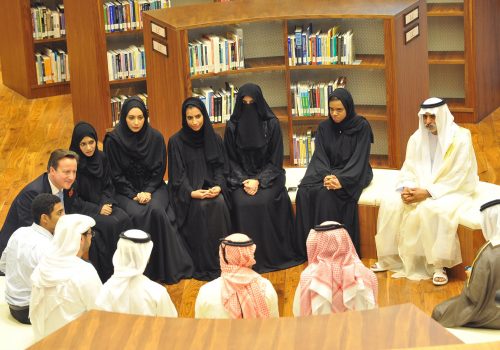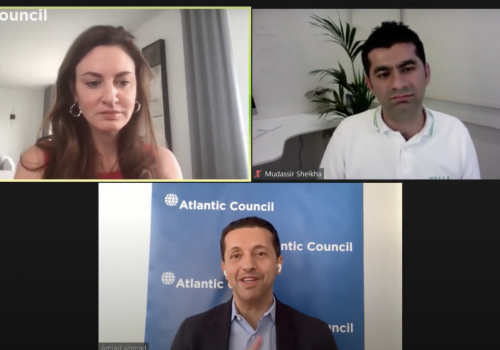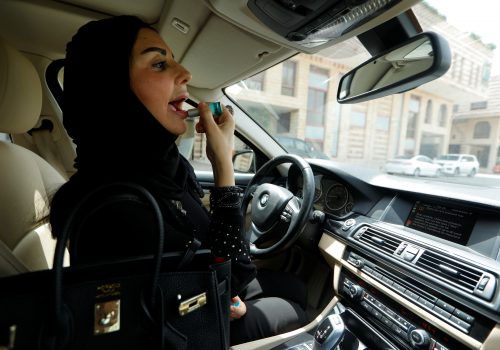Biden administration should act fast to bolster people-to-people exchanges with the Middle East
In the fall of 2016, the Atlantic Council’s Middle East Strategy Task Force (MEST), co-chaired by former US Secretary of State Madeleine Albright and former US National Security Advisor Stephen Hadley, offered a major set of policy recommendations for the incoming administration. We harken back to a critical emphasis in the 2016 report: “unlocking the human potential” of the Middle East and North Africa. Indeed, in addition to offering ideas about addressing the political crises of the region, a good deal of the MEST report talked about people—how to think about and support their needs and aspirations, with the prize being long-term positive change across the region.
While US policy toward individual Middle East and North Africa countries (MENA) will be hammered out in the interagency process through the first year of the new Joe Biden administration, we recommend action in the first months employing existing Public Diplomacy programs to reinforce support for unlocking human potential. Rapid expansion of successful, well-established programs would be far more effective than grand speeches and policy pronouncements. As we have learned over many administrations, what we do is far more important than what we say.
Our approach is guided by three premises:
- Most change in the region will occur because of internal forces in the varied MENA countries, not through external pressure.
- Despite enormous wealth in some corners of the region, there are plenty of unmet economic and social needs for the vast majority of MENA citizens, including provision of far more opportunities for women.
- The United States can play a helpful role by quickly expanding its existing public diplomacy people-to-people exchange programs.
Such an effort could help restore a sense that the US wants to stay engaged with this important region, even as the form of that engagement shifts from a largely military focus to one based on cooperation along economic, social, and cultural lines. In our view—barring unforeseen conflicts—there is no appetite left, either in the US or in the Middle East, for large-scale military involvement in the region. The debate about whether to downsize our military ambitions and presence in the region is essentially over. With that as a given, we should shift the focus from what we don’t want to do to what we can and should do. Existing tools of US public diplomacy provide a ready answer.
Our nation’s public diplomacy exchange programs bring selected current and future leaders from across the globe to the US to interact with their American peers on a broad range of strategic priorities and academic topics. At the same time, they send American citizens representing every region of our nation to countries around the world. Some of the exchange programs last a few days or weeks, while others continue for a year or more. All of them make indelible impressions on the participants and strengthen American national security by promoting bilateral relations, cooperation, and understanding on the individual level. Equally important, these exchanges help form and support leaders who will make a difference in the Middle East.
We recommend a rapid and significant permanent increase in funding for public diplomacy exchanges focused on MENA countries of up to fifty percent in sustained additional funds. The funding should be provided for four distinct areas, to include critical reinforcement of the human infrastructure that manages exchanges.
- Expand existing public diplomacy exchange programs with MENA countries: The Department of State currently runs a variety of exchange programs that have proven effective in the MENA region. These include the International Visitor Leadership Program (IVLP), the Kennedy-Lugar Youth Exchange and Study Program (YES), Fulbright student and scholar programs, and the TechWomen and TechGirls Programs, among others. Related programs provide in-country engagement with aspiring youth in these countries, including the English Access Microscholarship Program and student advising for American universities and colleges. The incoming Joe Biden administration should significantly increase funding so that these programs can reach, inform, and engage key audiences in the MENA region.
- Funding to strengthen exchange program alumni networks in the MENA region: While American and foreign exchange program participants have lasting memories of their programs, the true strategic value of these investments comes from the networks they create among alumni and between alumni and other individuals. And, though the Department of State has expanded its work with alumni in recent years, more funding is needed to strengthen three of the most effective types of alumni networks:
- The network that connects foreign exchange program alumni with American citizens: Exchange programs create important links between Americans and foreign counterparts, but we need to put in work after their individual projects to nurture and enhance those relationships.
- The network that connects exchange program alumni to each other: Each participant gains value from the exchange program. That value is multiplied when participants are connected with other alumni in their own country, in their region, or around the world.
- The network that connects exchange program alumni to other citizens: Each exchange program participant becomes an ambassador on their return home, sharing what they have learned, seen, and experienced with family, friends, and the broader public. Additional funding for the Department of State’s Office of Alumni Affairs and public diplomacy sections in US missions throughout the MENA region could fund more grants and programs for exchange alumni, which would expand their public and private engagement to better inform other citizens and promote shared values.
3. Funding to increase exchange program staff: Our proposed enhancements will benefit our nation and national security, but this requires additional work, and we can’t simply ask our embassies and consulates to keep handling additional responsibilities with the same number of employees. We need to reject the notion of “doing more with less” and seize the notion of “supporting the troops” in our management of public diplomacy. Additional funding should be provided directly to public diplomacy sections in the MENA region through the Department of State’s public diplomacy budget, specifically to add local staff and American officers to work with exchange program alumni. Similarly, any expansion of public diplomacy exchange programs for the region should include an appropriate level of funding for Washington-based staff to appropriately handle these additional responsibilities. This need for additional support extends to the many community organizations across the US—staffed mainly by dedicated volunteers—that have long been the engine of exchange programs. The State Department provides modest support to them, but they cannot be asked to do more without first providing additional operating funds.
4. Use COVID-19 to innovate, not delay: During the coronavirus pandemic, person-to-person exchanges have often had to take a virtual form and enormous innovation has taken place to keep exchanges vibrant. We cannot predict when in-person exchanges will fully return, but none of the steps we recommend should be stalled because of COVID-19, especially given the lead time associated with assembling new funding and expanding programs. We cannot accept coronavirus concerns as an excuse for inaction. However, while ramping up for more in-person exchanges, we should also pull together the lessons learned from the increased use of online exchanges and continue to innovate in the virtual space so that the number of people reached in the region can grow. The Stevens Initiative—a virtual exchange organization founded in honor of Ambassador Chris Stevens—and Soliya are leaders in this field, and other exchange organizations have followed suit. In-person and virtual exchanges, as well as hybrids of the two, will have permanent roles and should be supported.
The proposals we offer to enhance our exchange programs do not substitute the United States’ broad, coherent policy toward the region and its individual countries. What this modest approach does offer is a quick and relatively inexpensive strategy for shifting the emphasis of the US role in this region. It is not about messaging or short-term fixes to make people in the Middle East “like us” more or agree with all our actions. Rather, it is about collaborating effectively with the people of the MENA region as they pursue political, economic, and social development. It is about building trust, and that takes time, consistency, and energetic planning.
Ambassador (ret) Richard LeBaron is a Nonresident Senior Fellow at the Atlantic Council. He served as US Ambassador to Kuwait and in a number of other senior diplomatic positions in the Middle East and Washington. He is a member of the Advisory Council of Global Ties US. Follow him on Twitter: @RBLeBaron.
Dan Sreebny has forty years of Public Diplomacy experience with the Department of State and U.S. Information Agency, including multiple assignments in the Middle East. The views expressed are his own and not necessarily those of the US Government.
Image: Students hang out on a campus at the American University in Cairo October 24 2007. Drawn by curiosity about the Sept. 11 attacks on New York's World Trade Center in 2001, American students are venturing to the Middle East, eager to learn Arabic, study Islam and cut through media stereotypes as they prepare for careers in intelligence or diplomacy. Picture taken October 24, 2007. To match feature EGYPT-USA/STUDENTS REUTERS/Tara Todras-Whitehill


